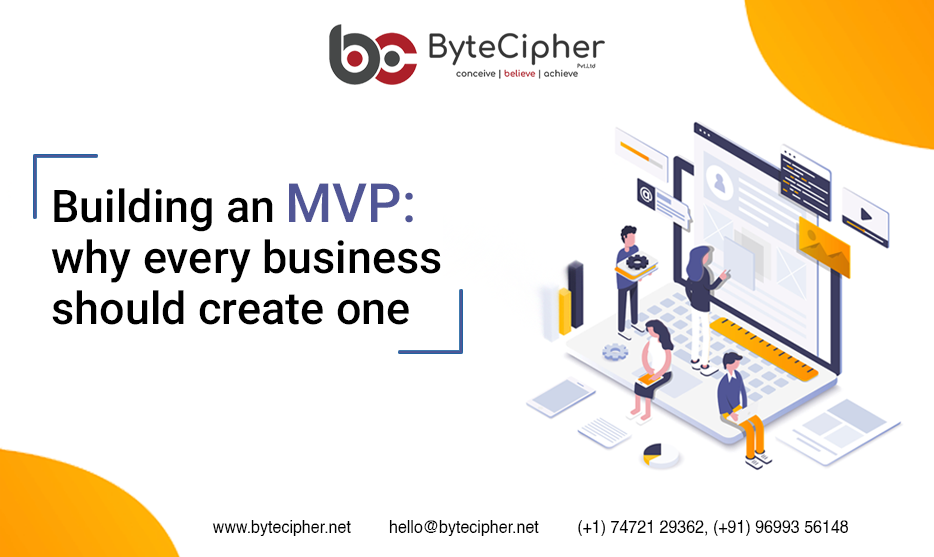Building an MVP
What if I told you that Facebook, Uber, and Amazon all have one thing in common in their software development company part? They were mostly able to grow into behemoths because they began small — each of them began as a Minimum Viable Product (MVP). An MVP, as the name suggests, is a software product that includes only the most essential (minimum) functionality but is also viable and can be used to solve a specific user issue. MVP development takes less time and resources than full-scale production, and the result is always impressive.
While creating a minimum viable product, entrepreneurs choose between experiments that can validate or invalidate their assumptions about a business model.
The benefits of developing a minimum viable product
1. Experiments can be conducted without fear of failure
An MVP is essential for both established software development company and startups, especially when releasing something innovative in mobile app development. When you have a new business idea, building an MVP is a good way to test the waters. Such a product does not necessitate significant investment and can instead concentrate on presenting the key feature of the future product.
It is beneficial to test whether your new product will generate the desired demand while avoiding significant financial losses. There is no need to go all-in because a minimum viable product will immediately reveal whether your project has a chance of success in the future.
Furthermore, MVP allows for the collection of feedback, which can then be analyzed, as well as the modification of the mobile app development services or web application direction while it is being developed. In addition to feedback, you may receive information about the users’ age, social group, and how they interact with your product.
This data can be used to improve features or add some crucial but missing functionality. It is worth noting that the minimalism of an MVP allows for these actions. The product is not yet finished, and you are gradually building it based on the factors mentioned above. A feature-heavy product, on the other hand, leaves far less room for change.
2. MVPs help to attract investors and stakeholders
Stakeholders and investors are critical for almost any business, and building an MVP is the best way to capture their attention for your software development company and demonstrate that your project is worth their money. Building a minimum viable version of a software product usually does not take much time or resources. However, if an MVP receives positive customer feedback and stimulates demand, it will be much easier to find stakeholders.
Stakeholders and investors are critical for almost any business, and building an MVP is the best way to capture their attention and demonstrate that your project is worth their money. Building a minimum viable version of a software product usually does not take much time or resources. However, if an MVP receives positive customer feedback and stimulates demand, it will be much easier to find stakeholders.
3. It Helps to Verify Market Demand
An MVP’s sole purpose is to conduct preliminary testing. It will show you which solutions work and which fail to meet the needs of your customers. Companies may mistakenly believe that their product will be in high demand because it addresses some critical problems and provides a suitable solution. They devote significant resources to full-scale development but are largely ignored by users. It is not uncommon for their solution to fail to establish effective methods of human-computer interaction, or for another better solution to emerge in the ever-changing market.
An MVP is the most efficient way to validate market demand before investing large sums of money. It effectively kills two birds with one stone. First, an MVP enables you to offer a potentially good solution to customers and gradually tailor it to their specific needs. Second, an MVP can undoubtedly be developed much more quickly than a full-scale product, allowing you to outperform your competitors and be the first to present an effective solution.
4. Enhances UX and usability
Almost one-third of mobile users abandon an app after the first or second attempt. The number of people who have downloaded your app is not a good indicator of its success. That is why it is critical to prioritize usability and user experience if you want your customers to use your product.
Establishing solid user engagement is a difficult but doable task, especially when the project begins with the development of an MVP. Customers usually understand that an MVP is just the beginning. If they liked the idea and solution, they will gladly share their experience with you to make your app more user-friendly.
Your software development company’s goal is to absorb and analyze their feedback. Then you should respond appropriately with timely and relevant updates. With this approach, there is no way you will fail to establish deep user engagement.
5. An MVP is Cost-Efficient
Although it has already been mentioned several times, this point deserves its section because the low cost of building an MVP is undeniably one of its primary advantages. Because they are in different weight classes, full-scale product development is unquestionably more expensive than minimum-viable product development.
In most cases, the gradual development of an MVP and its evolution into a full-scale product is a less expensive option than the traditional approach. When going all-in on development, companies frequently add many unnecessary features just to be safe, which can quickly add up. An MVP, on the other hand, includes only the most essential features and evolves gradually based on specific user needs.
Final Words
An MVP development aims to provide a safe testing environment at a low cost. It enables us to begin small and gradually expand while adding functionality and improving usability based on user feedback. It is one of the most secure and efficient methods for software development company.


























